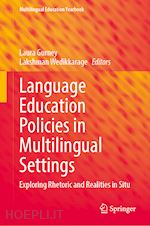
Questo prodotto usufruisce delle SPEDIZIONI GRATIS
selezionando l'opzione Corriere Veloce in fase di ordine.
Pagabile anche con Carta della cultura giovani e del merito, 18App Bonus Cultura e Carta del Docente
The volume provides grounded and contemporary insight into multilingual education from diverse perspectives – stemming from the authors' epistemic, cultural and geographic positioning around the world in different educational milieu – and will give both academic and practitioner audiences an up-to-date picture of multilingual education in the early 2020s. Multilingual education policies are continually implemented, re-evaluated and debated around the world, from primary to tertiary education. Fundamentally, however, educational policies manifest in classroom practice; the language envisaged in policy becomes the languaging of practice as teachers, learners and stakeholders negotiate educational curricula together. Internal and external forces – from resourcing to the Internet, to broader events such as pandemics and changes in government – shape the landscapes in which policies are enacted. The volume is extending the themes of the Multilingual Education Yearbook series in line with current developments in theory, research and practice. As such, this book provides a wealth of information to practitioners (teachers and teacher educators), researchers in applied linguistics and language education, postgraduate students in the field of applied linguistics, and policymakers.
Chapter 1: Multilingual education: Rhetoric and realities - Laura Gurney, Lakshman Wedikkarage.- Chapter 2: Native-speakerism, (dis)empowerment, and paradoxes of internationalization: An autoethnography of success and failure in language teaching and learning in Japan - Robert Lowe.- Chapter 3: Linguistic and cultural diversity of international lecturers as pedagogic resources in the EMI higher education - Koun Choi.- Chapter 4: Plurilingual teacher identity: Tensions and negotiations through native English-speaking teachers’ plurilingual teaching practices - John McGaughey.- Chapter 5: Students’ perceptions of translingual pedagogic practices in a Chinese EMI university - Malila C. A. Prado.- Chapter 6: Students as multilingual influencers: Towards linguistically diverse higher education in Anglophone contexts - Michiko Weinmann, Rod Neilsen, Israel Holas, AlistairWelsh, Su James, Ethan Colley, Hend Elkharraz.- Chapter 7: Exploring culturally responsive pedagogy for multilingual education in Aotearoa New Zealand language classrooms: Perspectives of teachers - Grace Yue Qi.- Chapter 8: Allocating limited library resources to linguistically diverse 8 communities: How can the superdiversity concept help? - Chiew Hong Ng, Cheung Yin Ling.- Chapter 9: Professional knowledge for language-driven CLIL teachers in Thailand: What do teachers need? - Nutthida Tachaiyaphum.- Chapter 10: Language of instruction as a social marker of difference - Birgit Brock-Utne.- Chapter 11: Using Maori-English dual language picturebooks to support the enactment of language policy in Aotearoa New Zealand educational contexts - Nicola Daly.- Chapter 12: Allocating limited library resources to linguistically diverse communities: How can the superdiversity concept help? - Louisa Buckingham.
Dr. Laura Gurney is Senior Lecturer at the University of Waikato in Hamilton, New Zealand, specialising in the theorisation of language practice and languages in higher education. Her work involves poststructuralist, posthumanist and new materialist approaches to language and education, and explores the nature/s of language, what language means to those who use it, and how we teach and use language in education.
Prof. Lakshman Wedikkarage works at the Faculty of Education, University of Colombo, Sri Lanka. He has researched the impact of globalization on education with particular emphasis on language-driven reforms in developing countries. His research interests also include medium of instruction in education, education policy analysis and bilingual education in developing countries.











Il sito utilizza cookie ed altri strumenti di tracciamento che raccolgono informazioni dal dispositivo dell’utente. Oltre ai cookie tecnici ed analitici aggregati, strettamente necessari per il funzionamento di questo sito web, previo consenso dell’utente possono essere installati cookie di profilazione e marketing e cookie dei social media. Cliccando su “Accetto tutti i cookie” saranno attivate tutte le categorie di cookie. Per accettare solo deterninate categorie di cookie, cliccare invece su “Impostazioni cookie”. Chiudendo il banner o continuando a navigare saranno installati solo cookie tecnici. Per maggiori dettagli, consultare la Cookie Policy.